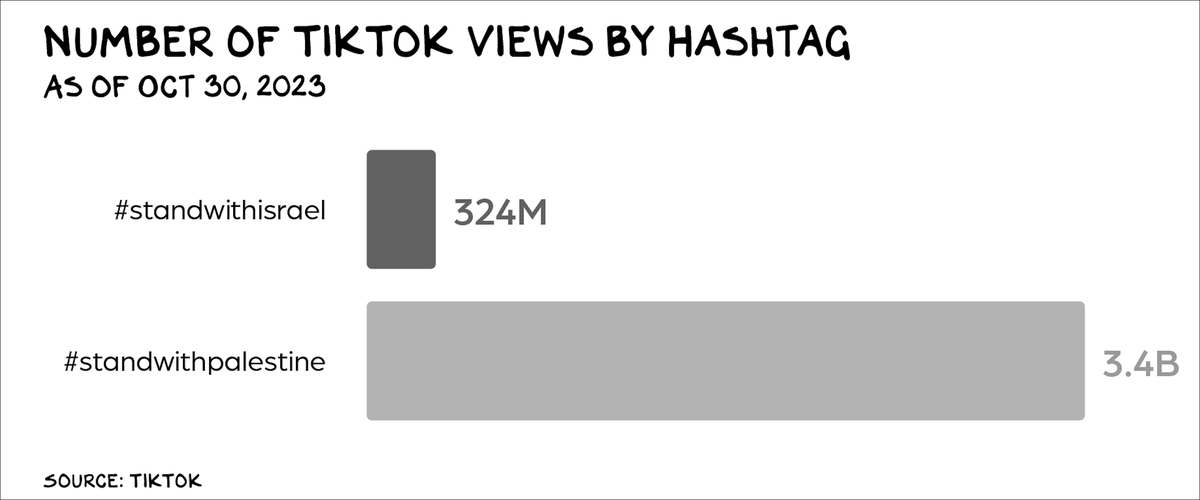
Full disclosure: This column may say more about the
nonlinear nature of what once was a contiguous national media experience -- a presidential debate -- but the truth is I watched last night's television event via a vMVPD platform (YouTube TV) so I
have no idea what others viewing it via linear broadcast, cable or other streaming platforms saw during the commercial breaks. But I can tell you that for me, the A position in each break was a TikTok
ad.
More than that, the ending of each TikTok spot got wrapped in a NBC News chyron and graphic making it eminently clear that TikTok was effectively the title sponsor (see what I saw
above).
As intended or unintended as that may have been, it was a striking adjacency for me, especially during one TikTok-sponsored break which had a lead-in in which the candidates discussed
China's potential military threats to the U.S., followed by a lead-out in which debate co-moderator Hugh Hewitt asked the candidates an even more explicit tie-in question:
advertisement
advertisement
"We're going to stay
on China and we're going to talk specifically about TikTok.
"Last week, Congressman Mike Gallagher, who is chairman of the House bipartisan Select Committee on the Chinese Communist Party
published a long essay on TikTok following the flooding of pro-Hamas propaganda on the TikTok accounts across the United States. Chairman Gallagher called it, 'shocking.' He called the act predatory,
controlled by America's preeminent adversary. One used to push propaganda and divide America. 'It's spyware,' he said, in means of surveillance."
A lot to unpack there, including the role
TikTok may or may not play in spreading disinformation, state-controlled propaganda designed to sow discord in American society, and to what degree the platform actually functions as "spyware,"
scraping intelligence and using it to target Americans based on -- well you know, all the things big data analytics is capable of targeting Americans based on.
And since Hewitt no doubt was
not watching the debate live on YouTube TV, I'll forgive him for not following up with the question I was thinking at that moment, "How in the world did TikTok's agency get all the A positions during
the debates showing the platform's warm-and-fuzzy commercial featuring a bunch of grandmas in a senior living community reconnecting with their youthful loved ones via TikTok?
The second
question that went through my mind was whether China's ByteDance ask NBC for a makegood after hearing Hewitt's question?
The third question that went through my mind was whether ByteDance paid
NBC for the bonus weight of the adjacency?
Never mind that the GOP candidates' responses to Hewitt's question devolved into personal attacks, especially the one that turned out to be one of
the sound bite highlights of the night -- the one in which Vivek Ramaswamy pointed out that Nikki Haley's daughter has been using the TikTok app for a long time, adding, "So you might want to
take care of your family first..."
"Leave my family daughter out of your voice," Haley jumped in.
(Pause for audible audience booing.)
"You're just scum," she continued.
Other than that exchange, the Republican candidates seemed unified in their response that TikTok has indeed been playing a questionable role in the dissemination of content to Americans, especially
out youngest ones, and represents a national security threat.
But honestly, I could say the same thing about most of the social media platforms headquartered right here in the U.S. of A,
starting with Twitter, but also Facebook, Instagram, and so on. And IMHO, I believe Chinese spyware aside, we need a national policy governing the dissemination of disinformation across platforms that
go viral at undebatable speed, and without the checks and balances that have historically come with mass media in the U.S.
I know that's not a popular opinion, and may seem like an odd one
coming from a journalist who believes the First Amendment is one of our fundamental rights.
But historically, the First Amendment has only protected journalists -- or non-journalists, citizen
journalists, or whatever you want to call anyone posting on social media -- right to speech, not freedom from any liabilities associated with speech. But when it's done on social media platforms,
Section 230 removes any liability for the publisher, so that check and balance no longer works.
In regards to TikTok specifically, I have no idea what role China's government plays in any of
that, but it is abundantly clear that the platform has achieved two remarkable goals toward that end: 1) It has become the media crack (or is it fentanyl) for young Americans using social media and
getting much of their news and information; and 2) Much of the news and information they're getting is of questionable veracity.
I was thinking about this when I read Scott Galloway's
excellent "Short Form War" commentary last week. I recommend you read it, but if not, I'm pasting an important data graphic here so you can
get the idea about the role TikTok has been playing in sowing discord about the conflict between Israel and Hamas:
